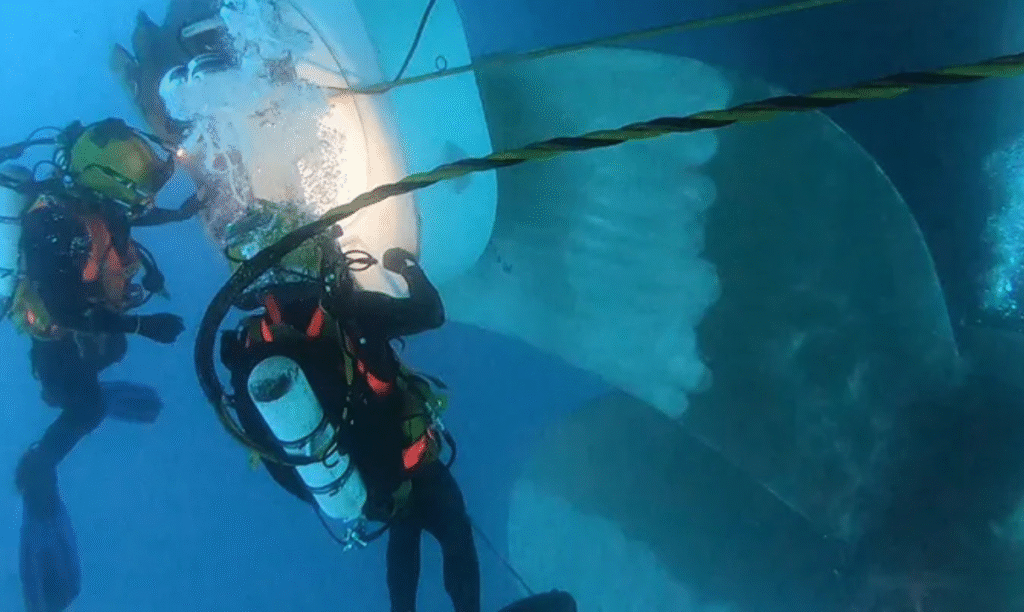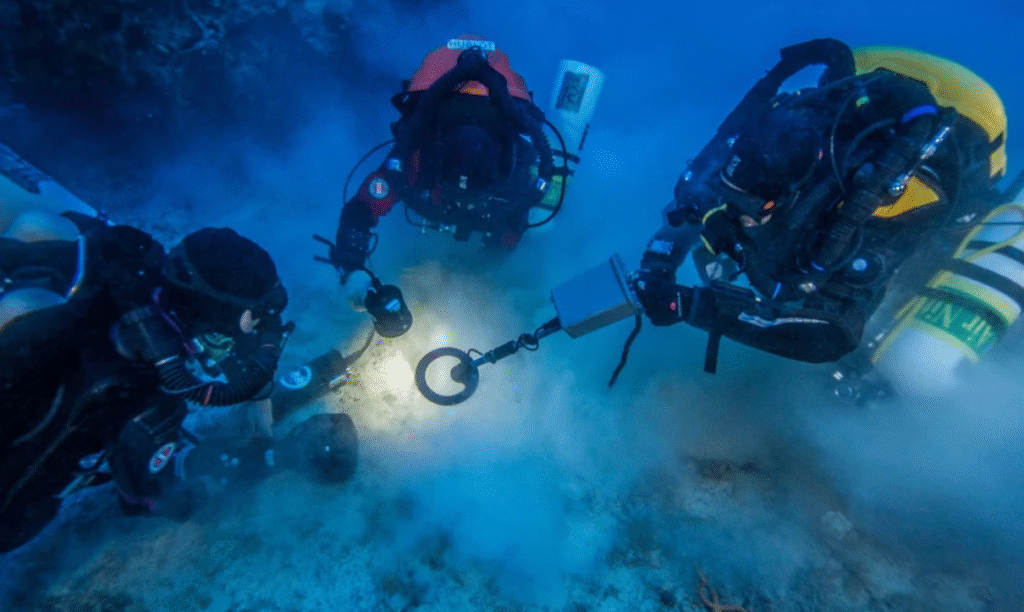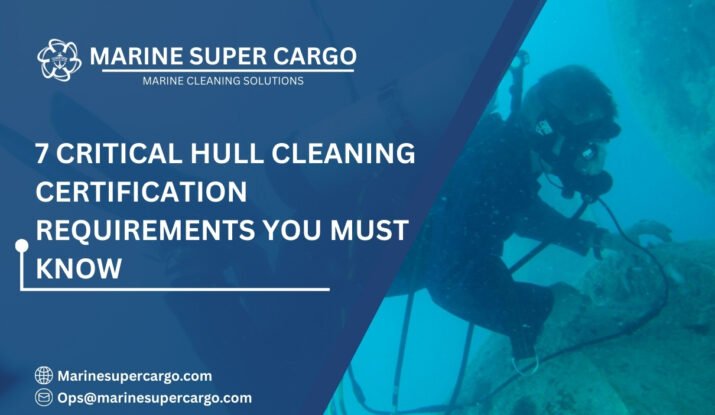Picture this: your ship is ready to set sail, cargo neatly stowed, crew prepared for a long voyage. But beneath the surface, marine growth coats your vessel’s hull—slowly draining efficiency, raising fuel costs, and risking compliance violations. This is where hull cleaning certification requirements step in: they don’t just shape how the job is done but who is qualified to do it.
In the maritime world, certifications act as passports. Without them, hull cleaning operations can lead to denied port entry, regulatory penalties, or worse—environmental hazards. If you’re a ship owner, operator, or fleet manager, understanding certification requirements such as IMCA, ADCI, and others is crucial for maintaining safe, legal, and cost-efficient operations.
This guide takes you deep into the world of hull cleaning certification requirements: their purpose, global frameworks, challenges, and the future trends that will reshape how ships stay clean.
Why Hull Cleaning Certification Requirements Matter
Imagine hiring a doctor who never went to medical school. Similarly, hull cleaning without proper certification is reckless. Hull cleaning certification requirements:
- Protect the environment – Ensuring no waste or invasive species are released.
- Guarantee diver safety – Certified teams adhere to strict safety protocols.
- Ensure compliance – Certifications verify that cleaning meets global laws like MARPOL.
- Protect your bottom line – Prevent hefty fines, detentions, or coating damage.
Put simply: certifications turn hull cleaning from risky guesswork into professional, accountable practice.

Global Framework of Certification Bodies
Multiple organizations govern hull cleaning certification requirements. Each provides standards designed to ensure safety, efficiency, and environmental responsibility.
- IMCA (International Marine Contractors Association) – imca-int.com
Industry standard-setter for diver competence, training, and safe practices. - ADCI (Association of Diving Contractors International)
Establishes international safety guidelines for commercial diving operations. - IMO (International Maritime Organization) – imo.org
Sets regulatory frameworks for ships to reduce marine pollution. - MARPOL – Marine Insight: MARPOL Convention
Dictates waste management rules for in-water cleaning. - IAPH (International Association of Ports and Harbors) – iaphworldports.org
Publish port guidelines on hull cleaning and invasive species control.
Together, these create the certification ecosystem every operator must understand.
Key Hull Cleaning Certification Requirements
To simplify, let’s break down the core hull cleaning certification requirements for divers and contractors:
- Diver Safety Certifications
- Minimum training levels under IMCA or ADCI.
- Medical fitness certifications to operate underwater.
- Environmental Compliance Certifications
- Knowledge of MARPOL Annex V (waste discharge).
- Training for non-toxic anti-fouling coatings.
- Operational Competence Certifications
- Proof of tool-handling proficiency.
- Experience in underwater navigation and controlled cleaning.
- Company-Level Certification
- Contractors must be members of IMCA or adhere to ADCI’s International Consensus Standards.
- Reporting Certifications
- Operators trained in proper documentation for inspection and compliance audits.
These certification requirements ensure divers are competent, companies are accountable, and the oceans remain protected. Also read about underwater hull cleaning in Hsinking.
The Certification Journey for Divers
Diver training isn’t just strapping on gear. To meet hull cleaning certification requirements, divers undergo a layered process:
- Basic Diver Training – Covering underwater safety, physiology, and navigation.
- Intermediate Training – Introduction to specialized hull cleaning tools and inspection methods.
- IMCA/ADCI Accreditation – Practical and theoretical examinations.
- Environmental Compliance Training – MARPOL knowledge, invasive species controls.
- Continuous Learning – Skills updated with new technology, digital reporting systems, and changing codes.
This journey is what transforms divers from beginners into industry-recognized professionals.
Tools and Techniques Under Certification
Certification doesn’t just cover people—it governs the tools and methods used during hull cleaning.
- Brush Carts and Scrubbers – Prevent hull coating damage.
- Vacuum Recovery Systems – Capture and contain fouling to prevent pollution.
- Hydraulic Tools – Certified operators must handle these safely in confined hull zones.
- ROVs (Remotely Operated Vehicles) – Increasingly included in certification training for hybrid cleaning methods.
Certification ensures that all operations keep a balance: clean hulls, safe divers, and safe seas. Learn more about California US EPA in-water cleaning regulations
Compliance Risks Without Certification
Skipping hull cleaning certification requirements is like sailing without insurance. Potential risks include:
- Detentions and bans at ports for failing inspections.
- Environmental penalties for illegal waste discharge.
- Injury or death due to ignored safety protocols.
- Insurance rejection, leading to massive financial exposure.
Non-compliance turns a manageable maintenance cost into an uncontrollable financial storm.
Best Practices in Meeting Certification Requirements
Think of certification requirements as a compass guiding ships through regulatory waters. Best practices include:
- Always align diver training with IMCA / ADCI guidelines.
- Conduct internal audits of certification records.
- Train divers in sustainable cleaning aligned with IMO and MARPOL.
- Maintain digital training logs for crew, simplifying inspections.
- Partner with certified contractors to avoid compliance gaps.
This proactive approach shields operators from last-minute failures during critical inspections.
⚓ Expert Underwater Hull Cleaning with Marine Super Cargo 🌊
— Marine Super Cargo (@Marinsupercargo) September 19, 2025
A clean hull means better performance, lower fuel use, and smoother voyages. Marine Super Cargo offers top Underwater Hull Cleaning to keep your vessel efficient, compliant, and ready for every operation. pic.twitter.com/sVKAUCytuS
Case Study: Certification Impact on Efficiency
A global operator noted that after aligning with IMCA and ADCI standards:
- Fuel efficiency improved by 12% due to consistent cleaning.
- Detentions at major ports dropped to zero over three years.
- Certification boosted stakeholder confidence in sustainable business practices.
This highlights how compliance not only ensures safety but also brings tangible returns.

Future Trends in Hull Cleaning Certification
The tide is shifting toward advanced certification models, including:
- Blockchain Logs – Immutable proof of compliance for authorities.
- AI-Driven Inspections – Cutting human error in reporting.
- Eco-Certifications – Ports mandating “green hull cleaning certificates” for access.
- Remote Training Models – VR simulations for trainee divers, lowering training risks.
The future of hull cleaning certification requirements blends technology with traditional safety and environmental frameworks.
Conclusion
Hull cleaning certification requirements are not just regulatory hurdles—they’re the foundation of safer, eco-friendly, and efficient ship operations.
- Certifications protect divers, ships, and the environment.
- Compliance with IMCA, ADCI, and IMO creates global trust.
- Certification adds measurable financial and operational benefits.
To maintain compliance and achieve sustainable hull maintenance, explore advanced solutions at CleanShip.co.
FAQs:
Q1. What are hull cleaning certification requirements?
They are mandatory standards set by bodies like IMCA, ADCI, and IMO to ensure diver safety, environmental protection, and regulatory compliance during ship hull cleaning.
Q2. Why do divers need certification for hull cleaning?
Certification validates that divers can safely handle tools, comply with environmental laws, and avoid damaging ship hulls.
Q3. How do certifications reduce costs for ship owners?
Certified cleaning operations maintain fuel efficiency, extend hull coating life, and prevent costly detentions or penalties.
Q4. Which authorities enforce certification requirements?
IMCA, ADCI, IMO, and port authorities enforce these standards globally, ensuring both safety and compliance.
Q5. What certifications will dominate the future of hull cleaning?
Expect eco-friendly certifications, digital proof of compliance via blockchain, and AI-driven certifications tied directly to sustainability reporting.


